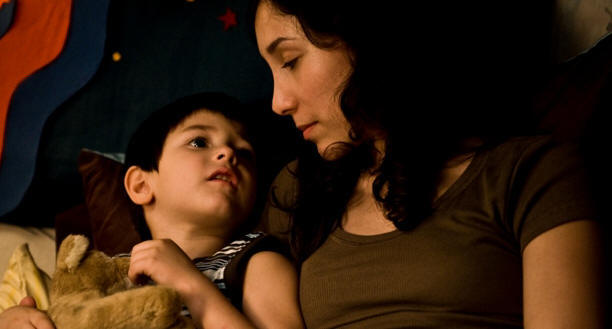Wednesday, January 12, 2011
PHOTOS |
COMING SOON|
EXAMINER.COM FILM ARTICLES
||HOME
MOVIE REVIEW
When We Leave (Die Fremde)
Umay's Choice: Istanbul
Or Germany? Alone Or Together?

Nizam Schiller as Cem and Sibel Kekilli as Umay, in Feo Aladag's drama "When We
Leave (Die Fremde)".
Olive Films
by
Omar P.L. Moore/PopcornReel.com
 FOLLOW
FOLLOW
Wednesday,
January 12, 2011
A tense, nail-biting experience powered by strong performances, "When We
Leave" is a penetrating story of a woman breaking free from an abusive
husband and conservative religious family traditions. Feo Aladag's film is
Germany's 2011 entry in the best foreign language film Oscar category.
The film opens in New York at the Angelika Film Centre and Los Angeles at
the Laemmle Theaters on January 28.
In Istanbul Umay (Sibel Kekilli), a woman of Turkish
descent, is repeatedly abused by
her husband Kemal (Ufuk Bayraktar). Her son Cem (Nizam Schiller) is caught
in the emotional and physical crossfire, a pawn on an adult chessboard. Umay's family, especially her harsh,
hard-line father Kader (Settar Tanriögen) declares that there's nothing wrong with a
slap or two from her husband from time to time. The welts on Umay's back say otherwise.
Against Kader's wishes Umay and Cem flee to Germany.
"When We Leave" succeeds mightily as a chronicle of a woman making the personal
and political decision to break free emotionally and physically from such
testosterone-fueled sexist fury. That last sentence may read as a trivial
description but isn't meant that way. "When We Leave" is necessary if
uncomfortable viewing. There's inspiration to be drawn from this somber
story, even if the hope it strives to achieve is in danger of being compromised.
The film works as an abundantly rich portrait of individuality and courage,
which its lead character has in abundance.
As a director
Ms. Aladag, a former actress, acutely observes what remains a very
treacherous landscape for women caught in fundamentalist (and sexist)
strictures where forced stays under the violent, oppressive and often murderous heel of
their spouses are customary. The director's writing is a little thin in
some areas, with some of the story devices amped up a little too conveniently
for the film's pace and manner. That said, Ms. Aladag's suspenseful, gripping drama is a
cruel tug-of-war that transfixes you with the perpetual fear Umay experiences.
We are her, and the slings and arrows of her pain shock us just as
much.
Often "When We
Leave" -- the title has multiple meanings in the story -- is a taut, unflinching
ordeal. In it Ms. Aladag never sacrifices the
essence of the real horrors of compulsion and the grave specter of "honor killing"
-- the idea that a family has been shamed, exclusively by one of its women or
girl members, typically a daughter -- who is then subject to a punishment of
death at the family's hands.
The film's politics bend less to religion (or a condemnation of it) than to this
direct crisis of women trapped
inside unforgiving families that are bitter enemies to them.
With Umay Ms. Kekilli finds and maintains the tone and
attitude of her character with a thoroughly confident, resilient performance.
It's fearless work. She gives the embattled Umay courage and undeniable steadfastness. The
film's unconvincing, fantasy-like love story involving Umay's German colleague is a momentary distraction
of elysian flair, incongruous to the drama at hand. Given the
extraordinary high-wire tension that dominates though, it's a welcome respite
from the stomach-knotting apprehension you feel. And I felt it deeply.
"When We Leave" aptly represents the truism that family tradition is
often the most oppressive yolk of all. The acting, especially by Derya Alabora as Halime,
is solid, though there's a
one-dimensional tenor to some of the supporting players. Does virtually
every male from Istanbul in the film have to snarl, bark and threaten
like a rabid dog? There's no room for credible balance in the film's male
characters, but maybe that's the point: for Umay every man in Istanbul is a
potential nightmare.
Halime is Umay's
mother, and in Halime Ms. Alabora wears the heavy strains of going along to get along with
her
husband Kader. Halime may have tried in the past to stand up to Kader
just as Umay tries to, but Halime ultimately failed. Her life is at a standstill.
She's a figurehead, a titular matriarch without a pure voice. You see
flickers of Halime's compassion for her daughter, but much of it is masked deep
within the contempt she has for her husband. It wouldn't be difficult to
imagine that Halime has been abused by Kader in
their long marriage. A revelation, Ms. Alabora's excellent
work is subtle and intriguing.
Yet I struggled with this unflinching film. There are things characters do
that ring false, contradictory or senseless within the scheme of movies and the
characters' own better natures. You'll probably see those aspects stick
out like a sore thumb. Other scenarios are more movie-like than
authentic-in-life, and with the real crisis of honor killings it's tricky or
risky to execute such incredible moves. These vital characters are smarter
than that. In the real environment, consequences may have been even worse
than what is shown here.
Still, "When We Leave" is a refreshing and powerful look at an anguished,
outrageous, complicated and disturbing epidemic. That Ms. Aladag explores
it as faithfully and honestly as she does is the film's greatest testament.
With: Sibel Kekilli, Tamer Yigiy, Serhad Can, Almila Bagriacik, Alwara Höfels, Florian Lukas,
Marlon Pulat, Nursel Köse.
"When We Leave (Die Fremde)" is not rated by the Motion
Picture Association Of America. In German and Turkish languages with
English subtitles. It contains harsh scenes, including bloody violence.
The film's running time is two hours. The film opens in New York at the Angelika Film Centre and Los Angeles at
the Laemmle Theaters on January 28.
 FOLLOW
FOLLOW
SUBSCRIBE TO THE POPCORN REEL MOVIE
REVIEWS RSS FEED
